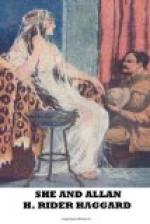“If you are wanderers who want food, as I judge by your being so thin, I am sorry that I have little meat, but my servants will give you what they can.”
“Ow!” said the spokesman, “he calls us wanderers! Either he must be a very great man or he is mad.”
“You are right. I am a great man,” I answered, yawning, “and if you trouble me too much you will see that I can be mad also. Now what do you want?”
“We are messengers from the great Chief Umslopogaas, Captain of the People of the Axe, and we want tribute,” answered the man in a somewhat changed tone.
“Do you? Then you won’t get it. I thought that only the King of Zululand had a right to tribute, and your Captain’s name is not Cetywayo, is it?”
“Our Captain is King here,” said the man still more uncertainly.
“Is he indeed? Then away with you back to him and tell this King of whom I have never heard, though I have a message for a certain Umslopogaas, that Macumazahn, Watcher-by-Night, intends to visit him to-morrow, if he will send a guide at the first light to show the best path for the waggon.”
“Hearken,” said the man to his companions, “this is Macumazahn himself and no other. Well, we thought it, for who else would have dared——”
Then they saluted with their axes, calling me “Chief” and other fine names, and departed as they had come, at a run, calling out that my message should be delivered and that doubtless Umslopogaas would send the guide.
So it came about that, quite contrary to my intention, after all circumstances brought me to the Town of the Axe. Even to the last moment I had not meant to go there, but when the tribute was demanded I saw that it was best to do so, and having once passed my word it could not be altered. Indeed, I felt sure that in this event there would be trouble and that my oxen would be stolen, or worse.
So Fate having issued its decree, of which Hans’s version was that Zikali, or his Great Medicine, had so arranged things, I shrugged my shoulders and waited.
CHAPTER III
UMSLOPOGAAS OF THE AXE
Next morning at the dawn guides arrived from the Town of the Axe, bringing with them a yoke of spare oxen, which showed that its Chief was really anxious to see me. So, in due course we inspanned and started, the guides leading us by a rough but practicable road down the steep hillside to the saucer-like plain beneath, where I saw many cattle grazing. Travelling some miles across this plain, we came at last to a river of no great breadth that encircled a considerable Kaffir town on three sides, the fourth being protected by a little line of koppies which were joined together with walls. Also the place was strongly fortified with fences and in every other way known to the native mind.
With the help of the spare oxen we crossed the river safely at the ford, although it was very full, and on the further side were received by a guard of men, tall, soldierlike fellows, all of them armed with axes as the messengers had been. They led us up to the cattle enclosure in the centre of the town, which although it could be used to protect beasts in case of emergency, also served the practical purpose of a public square.




